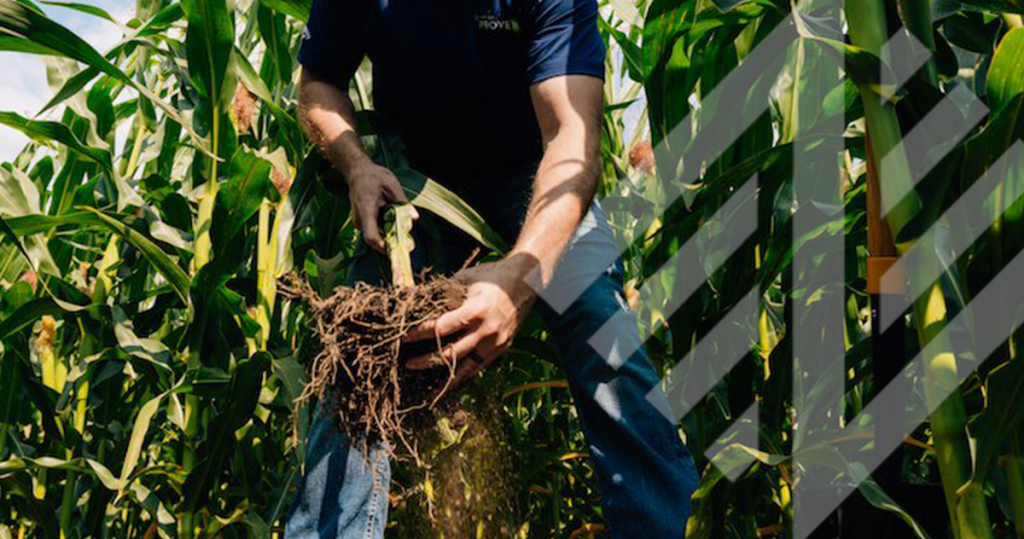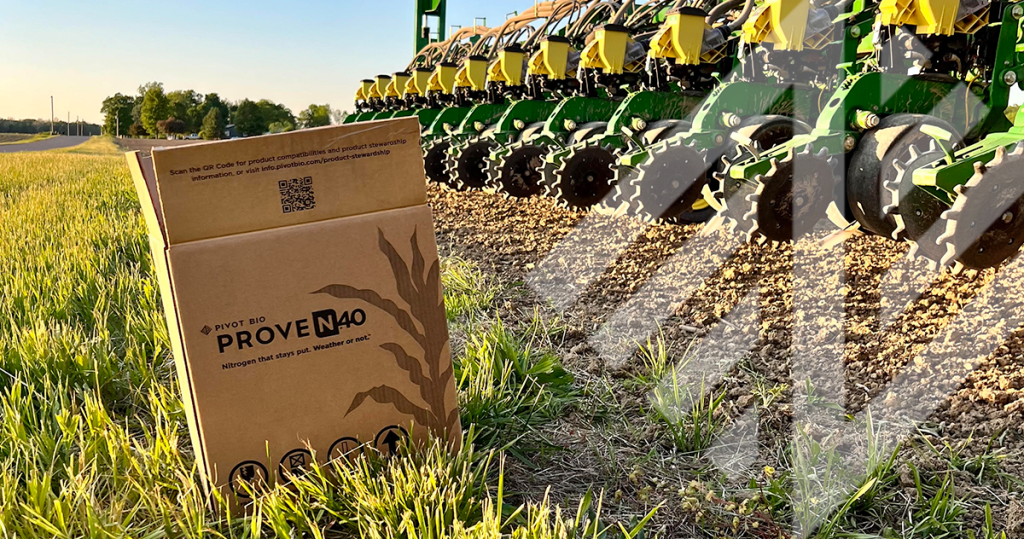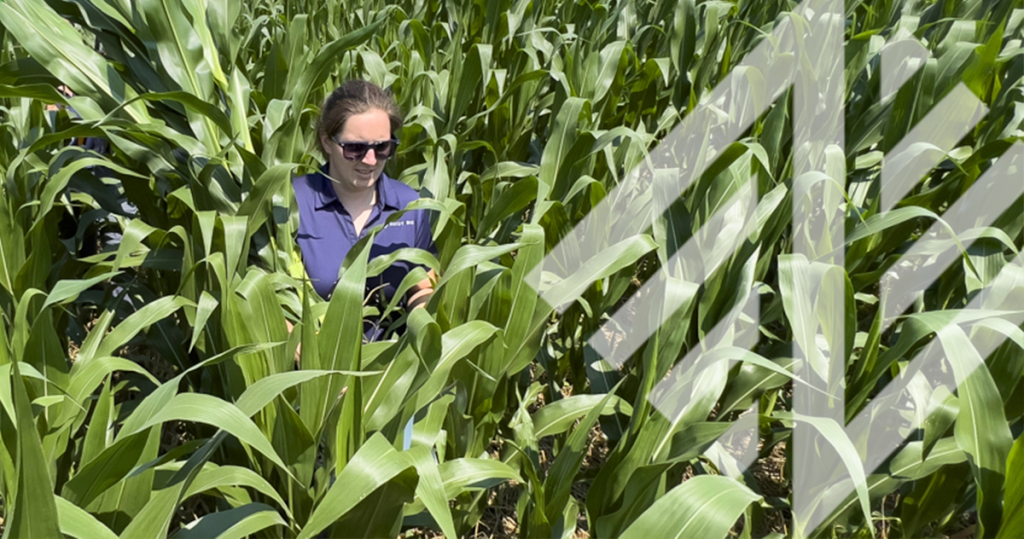ISU Researchers Measure Efficiency of Pivot Bio PROVEN® 40

Scientists at Pivot Bio have spent over a decade testing and fine-tuning our microbial nitrogen products in the lab and on-farm so that farmers can trust our product will deliver nitrogen to crops and make farming safer and more sustainable. Since then, we’ve partnered with more than 20 land-grant institutions over the years to gather data from independent research that examines different performance measures of our product. Recently, we collaborated with Iowa State University (ISU) to examine how PROVEN® 40 increases efficiency for farmers.
Farmers are all too familiar with the nitrogen dilemma. Crops need nitrogen to thrive and produce strong yields. With synthetic nitrogen applications, however, more than half the nitrogen they apply may never make it to the crop. Some nitrogen volatilizes into the atmosphere, some undergoes denitrification to form nitrous oxide, and some leaches into the groundwater as it moves through the soil profile. It’s inefficient, and represents dollars lost to farmers, who need to get the most value from their fertilizer inputs. With PROVEN® 40, microbes form a symbiotic relationship directly with the plant roots. It’s a more efficient way of providing nitrogen to crops, because the microbes effectively spoon feed the crop with nitrogen every day; something that is impossible for farmers to do with synthetic nitrogen fertilizers.
The researchers at ISU tested PROVEN® 40’s efficiency by examining how much nitrogen is lost through leaching and volatilization. One advantage of partnering with research institutions is benefitting from the expertise of some of academia’s leaders in science and innovation. Leading the ISU studies were Drs. Steven J. Hall and Matt Helmers. Dr. Hall is a biogeochemist who focuses on nutrient cycling, particularly how microbes, plants, and other elements affect nutrient transformation and loss. He is interested in sustainability, and frequently collaborates across disciplines like atmospheric science. Dr. Helmers researches water management and how agricultural systems and land use contribute to water quality issues. Much of his research currently focuses on soil leaching and how it impacts hydrology. The team established their trial in Ames, Iowa.
The researchers faced the challenge of accurately measuring how much nitrogen is lost as nitrate runoff in the soil and nitrous oxide emissions. Different weather patterns, soil types, and previous agronomy practices on the land can all affect nitrogen loss. Dr. Hall designed an ingenious solution that allowed the team to gather measurements with a level of accuracy that would otherwise only be possible in a laboratory. To gather data from undisturbed soil, Dr. Hall devised a system that installed a four-sided metal structure in the soil without disturbing the soil structure. These self-contained soil blocks are called mesocosms, and they allowed the researchers to accurately measure nitrate leaching in the soil, and nitrous oxide emissions. The team used two soil types from central Iowa, and planted corn in each block.
With 36 mesocosms in all, the team tested a non-treated check of three different nitrogen rates, 110, 150, and 190 lbs. nitrogen/acre respectively, and PROVEN 40 in combination with the three different nitrogen rates. Each block was fitted with a drain pipe system at the bottom, through which water would flow and be collected after rain events. This simulated water moving below the root zone and into groundwater. From these water samples, researchers could measure and analyze the concentration of nitrogen. At the top of the mesocosm, a conical stainless steel contraption seals the top of the soil block. Researchers extracted a weekly sample of the air from this cone to analyze nitrous oxide levels. These tightly controlled field conditions were ideal for testing PROVEN 40, as the water flow and nitrous oxide emissions were both realistic representations of typical central Iowa field conditions.
This innovative university research effort demonstrated that increased nitrogen application rates resulted in increased nitrate leaching and higher cumulative nitrous oxide emissions. However, the mesocosms that were treated with nitrogen and PROVEN® 40 lost less nitrogen than the blocks treated only with nitrogen fertilizer. The microbes in PROVEN 40 significantly decreased leaching, by an average of about 9 lbs. nitrogen/acre, according to the university data obtained in this study. “We would expect higher fertilizer rates to result in higher losses due to increased amounts of nitrogen fertilizer inputs,” says Dr. Hall. “What was fascinating was observing the effect of the microbes alone, which reduced leaching at the same rate by absorbing some nitrogen from applied fertilizer.” As has been shown in other studies, including recent studies at North Carolina State University, PROVEN® 40 can increase nutrient uptake early in the growing season, increasing biomass and contributing to healthier, more productive plants as well as reducing synthetic nitrogen losses, as demonstrated in Dr. Hall’s research.
These results are encouraging for farmers who choose to incorporate PROVEN 40 into their operations. Corn plants can more efficiently use nitrogen with the help of our nitrogen-fixing microbes, reducing the amount of synthetic fertilizer needed. This increases economic efficiency for farmers, as well, who can save money by reducing synthetic nitrogen.
Efficiency is one aspect we’re examining through our partnerships with esteemed research universities to provide independent data for our farmers.


